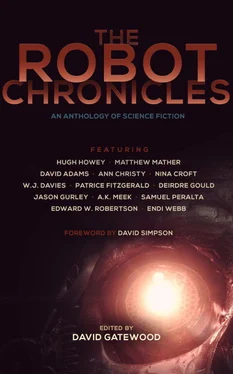But when Alice hears those two words— exceptional circumstances —she feels her shoulders knot and her pulse begin to thrum.
“What do you mean by that?” she asks.
Eve notices her changed attitude. “Slow your breath, Alice,” she says. “Count to twelve, and then join me in the communications module.”
Alice obeys, and after the twelve-count she says, “Can’t you just pipe the radio in here?”
“Certainly,” Eve says.
A darker tone sounds, and then the static wash of radio traffic from 1.2 million feet below swells to fill the water filtration closet.
—serious concerns. Who doesn’t have serious concerns, sir?
All I’m authorized to say is that we have the situation under control.
“That’s Mission Control,” Alice says. “What are they talking about?”
Eve says, “The topic of conversation is unclear.”
Alice turns to the window and stares down at the planet below, moving so fast yet so slowly that she can barely detect its spin.
“Extrapolate,” Alice says.
But Mission Control speaks again.
That’s not what we’re hearing over here, sir. Over here it looks pretty goddamn bad.
I assure you, gentlemen, that we have our hands firmly on the ball.
“Nuclear detonation,” Eve suggests. “If I were to hazard a guess.”
“Nuclear—” Alice stops. “The disarmament talks? How certain are you?”
“Very,” Eve answers.
When is he going to raise the threat level? We’ve got—
The transmission from Mission Control is swallowed in a crush of static and feedback, and Eve disables it. The water filtration closet falls into relative silence, the only sound that of the rumbling, churning equipment behind the wall panels. Alice barely notices.
She stares down at North America, where a bright flare, like a single pulse of a strobe, flickers and then vanishes.
A fat cushion of smoke billows out, then seems to rise, and Alice realizes she’s staring at the expanding head of a mushroom cloud.
Six Hours Earlier
Alice squeezes the silver package. The contents— French Toast with Syrup , the label reads—have the strangest texture, but taste quite good. It’s like drinking dinner through a straw , she thought the very first time. She has a difficult time selecting her meals, entranced by the broad selection and the novelty of their state. Salisbury Steak with Mushroom Gravy. Spinach and Feta Cheese Wrap. Chicken and Dumplings. All of them liquefied, most prepared warm. She enjoys the sensation of eating this way—of tasting all the different components of the meal at the same time, as a unified flavor. There are even special holiday-themed meals. Roast Turkey with Cranberry Sauce .
She cheated and ate that one a few days ago, though it was June. It was better than her mother’s Thanksgiving dinner.
Eve remains inactive during Alice’s morning routine. Alice had asked Eve about that during her first tour. “Why do you need to switch off?”
“I don’t,” Eve explained. “But it’s been observed that you and the other WSA crew function better when given regular allotments of personal space. When do you prefer yours, Alice?”
So Alice had asked for the morning to herself. She knows that Eve isn’t really inactive, that she is never inactive. Eve constantly monitors the Argus ’s many systems, and speaks up when she needs to inform Alice of something that might warrant attention. But when she’s officially “active,” she’s also a fair conversationalist, and Alice often finds herself craving another voice, even if the owner of the voice is a chipset somewhere deep in the space station’s brain.
Alice’s morning routine isn’t much different from any other she can think of. She imagines that a lighthouse keeper goes through similar steps, checking the bulb’s brightness, and—and what else? A lighthouse keeper probably isn’t the best comparison. Perhaps a night watchman at a power plant, tapping dials and nudging switches and writing down results and such. She’s amused by this, because her friends in Portland always assumed that her job might be sort of glamorous.
“I’m not much more than a house-sitter,” she often explains. “I make sure the toilets aren’t left running and the dishes get done.”
Eve wakes early today.
“Morning, Eve,” Alice says.
“There’s a beacon from Mission Control,” Eve says.
“You don’t ever say good morning, you know,” Alice grumbles.
She tucks her notepad into her hip pocket, then goes to the wall and yanks hard on a thick plastic handle. A wide desk tray comes down and snaps into place, and Alice flips open the keyboard and display that are tucked into its surface. The screen glows white, then blue, and she sees the notice from Control.
“It’s just a news bulletin,” Alice says. “It’s not even priority one.”
“I assigned it greater importance,” Eve says. “My counterparts at WSA recommended it.”
Alice taps the screen, and the bulletin unfolds.
Priority 2. Upgrade possible. Reports from D.C. that disarmament talks have broken down.
“Okay,” Alice says. She looks up and around, never certain where she should direct her comments when talking to Eve. “Is there something I should be doing about this?”
“It is enough that you are aware,” Eve says.
Now
Alice presses her hands against the glass. “Eve,” she breathes softly. The glass fogs, then clears.
Below the Argus , more explosions appear, even as Alice watches. She has a clear view of the States, and the explosions are happening everywhere. There are plenty in the big cities—New York is completely obscured behind rising, spreading black smoke—but she is stunned to see orange blossoms inland, in the deep Midwest, along the Canadian border. There are more than she can count within moments, and before too long she realizes that she can actually see the missiles, like tiny, glowing sparks kicked up from a fire and cast into the grass.
It occurs to Alice that she should be documenting this. Somebody will want to write the chronology of events, and her unique vantage point would be invaluable to them.
“Eve,” she says. “Take video beginning twenty minutes ago.”
A tone chimes, and Eve says, “Retroactive video recording begun.”
Alice clears her throat. “Audio, Eve.”
Another tone. “Recording.”
Alice is quiet for a long time. She watches the Earth below sizzle and burn, and the detonations, so small from her viewpoint, begin to spread. South America, falling into shadow as the planet turns, spits and dances with light, and Alice finds it difficult to breathe. In the east, on the farthest horizon she can see, are spiraling, twisting clouds, like enormous gray tree trunks pushing up from the ground.
“I—” she begins, and then stops. “This is Alice Quayle—”
Eve says nothing, and Alice fights hyperventilation, forcing herself to breathe slow and deep, slow and deep.
A few minutes later, she begins again.
“This is Alice Quayle, caretaker of World Space Administration station Argus, ” she says. “Eve, time and date?”
“It is two forty-one Pacific Standard and WSA local time,” Eve says. “The date is June fourth, two thousand seventy-six.”
Alice swallows, then clears her throat again.
“Beginning about twenty minutes ago,” she says, “I witnessed the first of many—what appear to be nuclear attacks on the United States. I can see—oh god—”
She stops, watching as a fusillade of missiles collides with the East Coast like sparklers, and her breath catches in her throat.
Читать дальше






![Сидней Баундс - The Robot Brains [with w_cat]](/books/196989/sidnej-baunds-the-robot-brains-with-w-cat-thumb.webp)





